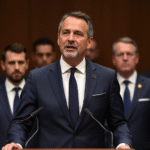Introduction to the Mexican Customs Overhaul
The government of Claudia Sheinbaum has proposed a legislative package that, if approved, will equip it with powerful tools to fight corruption, smuggling, tax evasion, and tax avoidance. This initiative aims to cleanse and purify Mexico’s entry and exit points for international trade.
The Importance of Customs in Mexico’s Public Finances
Customs play a crucial role in Mexico’s public finances, generating around 30% of the country’s tax revenue. This amounts to approximately 1.3 billion pesos annually, making them a significant source of government income.
With the need for increased revenue due to fiscal adjustments, weak “pet projects,” and the decision not to implement tax reform, Mexican customs have become an extraordinary source of resources. Moreover, with the current focus on export and import activities’ growth, customs revenue has immense potential for expansion.
In the context of U.S. President Donald Trump’s protectionist policies, Mexican customs have gained new relevance as a matter of national security. The Mexican government’s decision to follow Trump’s lead in implementing tariffs on countries without trade agreements has made customs even more critical.
Proposed Tariff Increases
The Mexican government intends to raise tariffs on 1,371 customs fractions across various industries, affecting nearly 9,000 total fractions. This move aims to boost import-derived income from 181,100 million pesos to 254,800 million pesos. The estimated tariff revenue increase is a substantial 40%!
Government’s Customs Reform Proposal
The customs reform bill arrives at the legislative power on September 29th. Previously, the government has publicly addressed issues within Mexican customs.
On September 25th, Erik Jiménez Reyes, the General Administrator of Commerce External Audit at SAT, disclosed a stark diagnosis during a meeting with Hacienda Commission delegates. He reported 109 corruption cases in customs, resulting in over 22 billion pesos in losses. From January to August 2025, 205 verifications were conducted, leading to the seizure of 205.564 billion pesos worth of illegally introduced foreign merchandise and 7.554 billion pesos in fines for unverified legal stays.
Rafael Marín Mollinedo, head of the National Customs Agency of Mexico, highlighted a 24.5% revenue increase in customs due to a 7% decrease in operations caused by global economic conflicts and tariffs.
Carlos Gabriel Lerma Cotera, the Undersecretary of Income at the Ministry of Treasury and Public Credit, clarified the reform’s purpose. It aims to strengthen the country’s financial sustainability without introducing new taxes for compliant citizens or ensuring those who owe pay up.
Concerns from the Private Sector
Despite the government’s clear objectives and customs’ importance, concerns exist within the private sector. The National Council of Industrial Entrepreneurs (Canacintra) warns of potential shortages in intermediate goods and production inputs if the customs reform is approved.
Canacintra advocates for clear, measurable rules to prevent production line stoppages, overcosts, and bottlenecks. They emphasize balanced responsibilities throughout the supply chain, as concentrating obligations on customs brokers adds time and costs.
Zaira Padilla Vergel, representative of the Strategic Fiscal Enclosures Association, asserts that the customs reform will increase foreign trade operation costs. Nonetheless, the Mexican government recognizes customs’ vital role in public finances amidst resource scarcity and commitments to the U.S.






